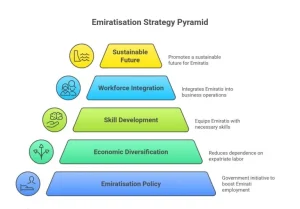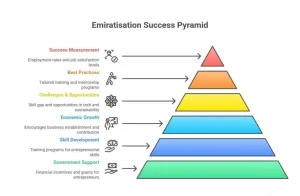With the diversification of the UAE’s economy, Emiratisation has become a focus for businesses. As you know, the Emiratisation strategy aims to boost the participation of Emirati nationals in the workforce. The purpose behind this is to promote a sustainable future for Emiratis. While enriching the local economy.
For organizations, embracing Emiratisation is not just a compliance requirement. It’s an opportunity to tap into the unique skills that Emirati talent brings. Whatever the reason is, we unwrap the detailed insights here.
This guide walks you through the Emiratisation strategies businesses can adopt. Turning to effectively integrate Emiratisation into their operations. From recruitment and training to fostering an inclusive workplace culture. How can they effectively contribute to national goals by aligning with this initiative?
Understanding Emiratisation
Emiratisation is a government initiative in the UAE. The Emiratisation rule aimed at boosting the employment of Emirati nationals. This is particularly in the private sector. Emiratisation strategy is essential for diversifying the economy. It reduces dependence on expatriate labor.
The policy focuses on equipping Emiratis with the necessary skills. So that they can thrive in various industries. Emiratisation creates a workforce that is well-prepared for future challenges by aligning educational curricula with market needs.

Emiratisation Policies and Initiatives for Startups
Within startups, the UAE government has introduced several policies to support Emiratisation. These may include financial incentives and grants for local entrepreneurs. It encourages Emiratis to establish their businesses and contribute to economic growth.
Further, training programs are specifically designed for startup founders. The purpose is to equip Emiratis with essential entrepreneurial skills. Networking and mentorship opportunities also play a crucial role. It fosters a vibrant startup ecosystem for Emirati talent.
Challenges and Opportunities in Emiratisation
The biggest challenge would be the already existing skill gap, which would eventually deny Emiratis employment in organizations. Another complicating factor is the lack of opportunities in certain fields.
Technology and innovation will, however, be an important chance to succeed. In areas such as tech and sustainability, the country has a specific opportunity that will give Emiratis much-needed space to monetize their perspectives, which then fuels the economy forward.
Best Practices for Effective Emiratisation
Implementing tailored training and development programs is key to successful Emiratisation efforts. In fact, it is the organizations that focus more on mentorship and clear career progression avenues that end up engaging and retaining the Emirati employees the most.
Such a workplace culture appreciative of diversity is in need. This can be done by involving Emiratis in decision-making processes, thus making the worker feel a part of an organization.
Measuring Emiratisation Success
The success of Emiratisation is measured by key performance indicators: employment rates and Emirati job satisfaction levels. Continuous assessment helps organizations find strengths and weaknesses in the initiative.
Feedback mechanisms, such as survey,s give insight into the effectiveness of training and support programs. The constant monitoring of progress leads businesses to adjust their Emiratisation strategies so that outcomes will improve the results.
Future Trends in Emiratisation
It is a stage of digital transformation where Emiratisation will be more concerned with making Emiratis skilled enough in technology and innovation. The market demand for technically sound professionals is highly in demand; education and training programs will be designed according to this in the future.
In addition, because of the growing emphasis on sustainability, there are also new opportunities for the Emiratis in green technologies. Aligning with these trends will be crucial for being successful in the long run with Emiratisation initiatives in an economy where the business world is rapidly.
What is Emiratisation?
According to the Emiratisation Law 2024, it’s an initiative by the UAE government. To increase Emirati nationals’ employment in the private sector. Primarily focuses on equipping local talent with the skills essential for various industries. Ultimately, it promotes economic diversification. The goal is to reduce reliance on foreign labor. While empowering Emiratis in the workforce.

Why is Emiratisation Important?
Emiratisation is vital for fostering economic sustainability. It greatly reduces dependency on foreign labor in the UAE. The employers enhance national identity by empowering Emirati nationals. This, in turn, contributes to social stability while promoting a skilled workforce.
In addition, Emiratisation supports the UAE’s vision of diversifying its economy. While it encourages innovation and entrepreneurship among locals. To build a resilient economy, this initiative is integral. It greatly adapts to global changes.
Evaluating Effectiveness
Evaluating the effectiveness of Emiratisation involves:
- Assessing employment rates
- Job satisfaction, and
- Retention of Emirati employees in various sectors
However, regular reviews and feedback mechanisms are essential to measure the impact of policies. Additionally, tracking progress against set goals allows for informed adjustments to strategies. This continuous evaluation helps identify best practices and areas needing improvement to enhance Emiratisation outcomes.
Case Studies of Successful Emiratisation
Successful Emiratisation initiatives can be seen in various sectors, such as banking and technology, where Emirati employees have excelled. For instance, some banks have implemented targeted training programs that significantly increase Emirati representation.
Another example is tech startups that have embraced Emiratisation by fostering innovation among local talent. These case studies demonstrate how effective Emiratisation strategies can lead to meaningful integration of Emiratis into the workforce.
Emerging Technologies and Their Impact
Emerging technologies are reshaping the job landscape, like AI and blockchain. It presents challenges and opportunities for Emiratisation. These technologies require a new set of skills. Their inclusion prompts a shift in training and education for Emiratis.
The UAE can prepare its workforce for the future by embracing these innovations. Digital skills development will ensure Emiratis remain competitive in an evolving job market.
Global Trends and Emiratisation
Global trends, such as remote work and digitalization, are influencing Emiratisation efforts by creating new employment paradigms. These shifts encourage the integration of Emiratis into diverse roles, enhancing their adaptability in a globalized economy.
The focus on sustainability and green jobs aligns with worldwide environmental goals. It provides additional avenues for Emirati participation. Adapting to these trends is essential. It helps in maintaining relevance in the global market.
Government Policies
The government of the UAE has, over the years, proposed various policies that come in the form of quotas and monetary incentives for hiring Emirati nationals by companies. These present efforts toward an overall facilitative environment of local employment.
Other policies promote entrepreneurship among Emiratis, bringing forth an innovation culture, such as other policy initiatives, that aim to create a framework for successful Emiratisation by governments.
Private Sector Initiatives
The Emiratisation in private sector also contributes to the success of Emiratisation programs. Since organizations are indeed busy creating opportunities for employees in employment. Most firms have devised tailor-made training courses aimed at enhancing the competencies of homegrown talent.
Cooperation between the government and the private sectors is also regarded as the leading means through which Emiratisation is being adopted. This cooperation has helped in harmonizing what is needed in the labor market with the competencies of Emirati nationals, thus making them better absorbed into the job market.
Challenges Faced
Despite progress, Emiratisation faces challenges such as skill gaps and a lack of awareness among Emiratis about available opportunities. Cultural perceptions and expectations about certain job roles can also hinder local participation.
Moreover, some sectors may still be reluctant to hire Emiratis, citing concerns about productivity and retention. This leads to not fulfilling the Emiratisation target as specified by the UAE government. Addressing these challenges requires ongoing dialogue and collaboration among stakeholders.
Opportunities for Growth
Emiratisation is an emerging industry sector that would increase many growth opportunities, especially in the new sectors such as technology and renewable energy. The economic diversification process for the UAE increases the need for skilled Emirati professionals.
Besides, there will be entrepreneurship among Emiratis, which can create new businesses and new jobs. Therefore, promoting innovation through emiratisation will be important for the economic resilience of the UAE.
Talent Development Programs
Talent development programs are essential. It equips Emiratis with the skills needed to succeed in various industries. These programs often include:
- Workshops
- Courses, and
- Hands-on training tailored to market demands.
By doing this, Emiratis prepare to meet the challenges of a dynamic workforce. They will start focusing on continuous learning and professional growth. Such investment is vital for the long-term success of Emiratisation.
Internship and Training Programs
Internships and training programs play a crucial role. They bridge the gap between education and employment for Emiratis. It provides practical experience. Emiratis get more exposure to real-world work environments.
In addition, such programs help build essential skills and confidence. Give Emiratis to transition smoothly into their careers. However, collaboration between institutions and businesses enhances the effectiveness of these training opportunities.
Mentorship and Coaching
Mentorship is a vital component of effective Emiratisation strategies. It offers guidance and support to Emirati employees. Experienced professionals can help with career paths and develop essential skills.
Organizations can cultivate a culture of learning and growth by fostering relationships between the two. This support system enhances individual performance. It also strengthens workforce engagement.
Key Performance Indicators (KPIs)
Key performance indicators are essential for measuring the success of Emiratisation initiatives. Common KPIs include:
- Employment rates of Emiratis
- Retention rates, and
- Satisfaction levels among local employees.
Tracking these indicators regularly allows organizations to evaluate their strategies. It helps them in making data-driven adjustments. Ensuring that Emiratisation goals are met effectively.
FAQs for Emiratisation Strategy for Businesses
What is Emiratisation? Why should businesses care?
Emiratisation is an initiative of the UAE. Its prime purpose is to boost Emirati employment. For businesses, it helps achieve compliance. Providing them a chance to diversify talent and support the economy. The efforts strengthen long-term sustainability.
What strategies can businesses adopt to implement Emiratisation effectively?
Businesses can adopt the following strategies to implement Emiratisation, including:
- Tailored training.
- Mentorship.
- Clear career growth paths.
These strategies foster inclusive workplaces and align with government policies.
What challenges do businesses face with Emiratisation? How can they turn them into opportunities?
Businesses face many Emiratisation challenges. These challenges include skill gaps and sector reluctance. They can turn these challenges into opportunities. Invest in training and create roles for Emiratis to add fresh perspectives.
How can startups benefit from Emiratisation policies?
Startups gain benefits from the initiative policies in the form of financial incentives and tailored training programs. They foster innovation and stronger community ties by embracing Emirati talent.
How do businesses measure the success of their Emiratisation strategy?
Businesses measure program successful implementation through KPIs like:
- Emirati hiring rates.
- Retention.
- Job satisfaction.



